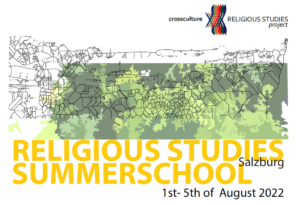
Herzlich willkommen zu unserer ersten Summer School des Crossculture Religious Studies Project, die vom 1. bis 5. August 2022 in Salzburg stattgefunden hat.
Während dieser vier Tage werden Sie verschiedene Aspekte der interkulturellen Religionswissenschaft hören, z.B. „Crossculture – ein methodisches Muss in der Religionswissenschaft?“ oder „Buddhistisch-muslimische Beziehungen in Südostasien“, von verschiedenen Professoren der beteiligten Universitäten Haifa, München, Seoul, Nairobi, Yogyakarta und Salzburg. Religionen sind globale und lokale Phänomene, die eng mit der Tradition, Sprache und Kultur bestimmter Orte verbunden sind. Gleichzeitig stellen sie zeitlose Fragen nach dem Sinn des Lebens, nach den Bedingungen der menschlichen Existenz und nach ethischen Implikationen. Die Religionswissenschaft muss daher immer interkulturell und interdisziplinär sein. Wir glauben, dass der beste Weg, Religion zu verstehen, darin besteht, Fragen zu stellen und Antworten darauf mit einer multiperspektivischen Haltung zu suchen. Die Religionswissenschaft ist und soll ein kulturübergreifendes Projekt sein. Postkoloniale Debatten haben gerade erst begonnen, verschiedene Aspekte dieser Agenda aufzuschlüsseln. Diese Sommerschule und das Crossculture Religious Studies Project sind akademische Arenen, in denen wir voneinander lernen können, wie wir unsere Welt aus unterschiedlichen Perspektiven verstehen können.
Wir fühlen uns geehrt, Sie im Sommer in Salzburg begrüßen zu dürfen. Salzburg ist nicht nur für seine atemberaubenden Festivals bekannt, sondern auch für seine fluffigen Mehlspeisen, seine grünen Stadtberge und seine herrlichen Seen. Die Summer School findet in Kooperation mit den Salzburger Hochschulwochen statt, einer internationalen und interdisziplinären Sommeruniversität im Herzen der Stadt, die 1931 von den Benediktinern des gesamten deutschsprachigen Raums gegründet wurde und heute eine Veranstaltung der Paris Lodron Universität Salzburg ist.
-> Für weitere Informationen schauen Sie bitte auf die Englische Seite.




